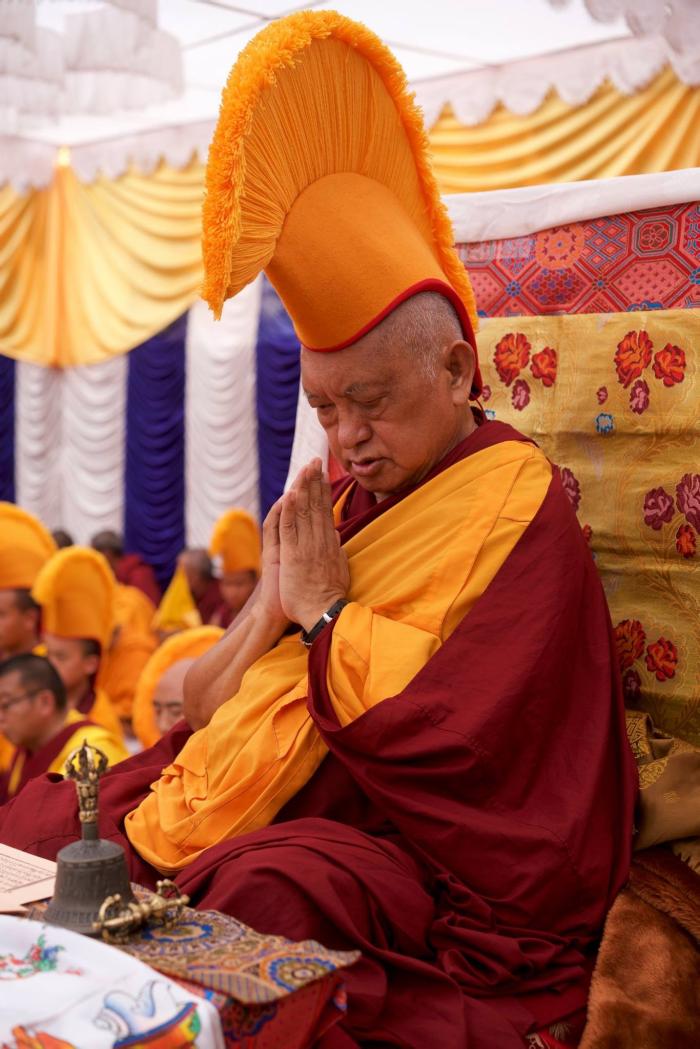Dear Friends,
Welcome to the April issue of our monthly e-letter. We hope you enjoy reading updates of our latest work that we undertake together, for the benefit of all beings everywhere. Please share!
New in LYWA Multimedia: Introduction to the Chanting Lineage of the Guru Puja
From the Video Archive: Lama Zopa Rinpoche visits Nalanda Monastery (2001)
The monks at Nalanda Monastery produced this video chronicling Lama Zopa Rinpoche’s visit to Nalanda on March 27, 2001. It includes a talk to the monks about the benefits of building monasteries, Rinpoche demonstrating how to make offerings to the pretas, as well as precious informal footage of Rinpoche with the monks. You can also find a lightly edited transcript of the talk on our website.
This month on the LYWA podcast: Lama Zopa Rinpoche on The Nature of Samsara (2006)
In this month's podcast, Lama Zopa Rinpoche answers questions on the nature of the mind followed by a discourse by Rinpoche on the nature of samsara. Rinpoche gave these teachings at Root Institute, Bodhgaya, India, December 26-31, 2006.
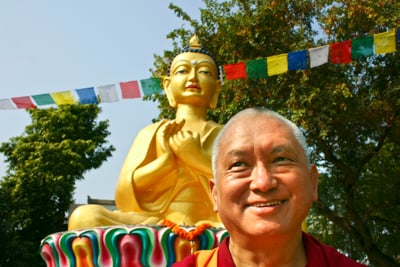 You can listen to the entire talk and also follow along with a lightly edited transcript of these teachings.
You can listen to the entire talk and also follow along with a lightly edited transcript of these teachings.
The LYWA podcast features incredible selections from the thousands of hours of audio recordings in our Archive of Lama Yeshe, Lama Zopa Rinpoche and now Tenzin Ösel Hita. All the podcasts provide links back to our website where you can listen to the podcast while reading along with a lightly edited transcript. You can download previous episodes and find out how to subscribe on our podcast page.
Back on the shelf: Teachings from the Vajrasattva Retreat
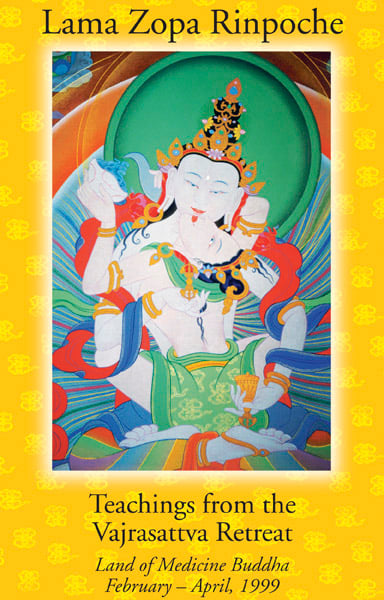 This vast and profound book, Teachings from the Vajrasattva Reteat, has been out of print for some time but is available again through Amazon’s Print-on-Demand service and now also as an ebook. This book is an edited transcript of Lama Zopa Rinpoche’s teachings at a three-month Vajrasattva retreat held at Land of Medicine Buddha, Soquel, California, from February 1 to April 30, 1999. The entire text was reviewed and updated by web editor Sandra Smith to reflect the most recent versions of mantras and practices as specified by Rinpoche.
This vast and profound book, Teachings from the Vajrasattva Reteat, has been out of print for some time but is available again through Amazon’s Print-on-Demand service and now also as an ebook. This book is an edited transcript of Lama Zopa Rinpoche’s teachings at a three-month Vajrasattva retreat held at Land of Medicine Buddha, Soquel, California, from February 1 to April 30, 1999. The entire text was reviewed and updated by web editor Sandra Smith to reflect the most recent versions of mantras and practices as specified by Rinpoche.
Rinpoche’s teachings during retreat were of three types: weekend public teachings, teachings at special events such as a light offering meditation, two long life initiations, a Medicine Buddha puja preceding a jang-wa ceremony for the dead, and an animal liberation ceremony; and finally teachings given during the Vajrasattva retreat sessions themselves. During retreat sessions, Rinpoche would often arrive unannounced and proceed to explain various parts of the practices being done at the time.
We are so grateful to everyone who has reviewed a LYWA title on Amazon, Google Play or other online marketplaces. Your reviews of LYWA books cause more people to be introduced to the teachings of Lama Yeshe and Lama Zopa Rinpoche. Please keep the reviews coming. Thank you so much!
WHAT IS NEW ON OUR WEBSITE
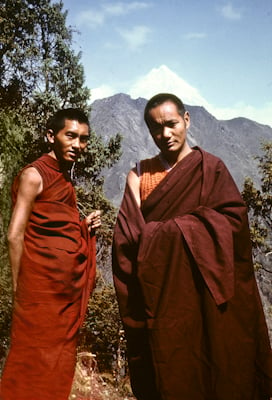 This month's new additions to Lama Zopa Rinpoche's Online Advice Book include:
This month's new additions to Lama Zopa Rinpoche's Online Advice Book include:
LYWA STAFF HIGHLIGHTS
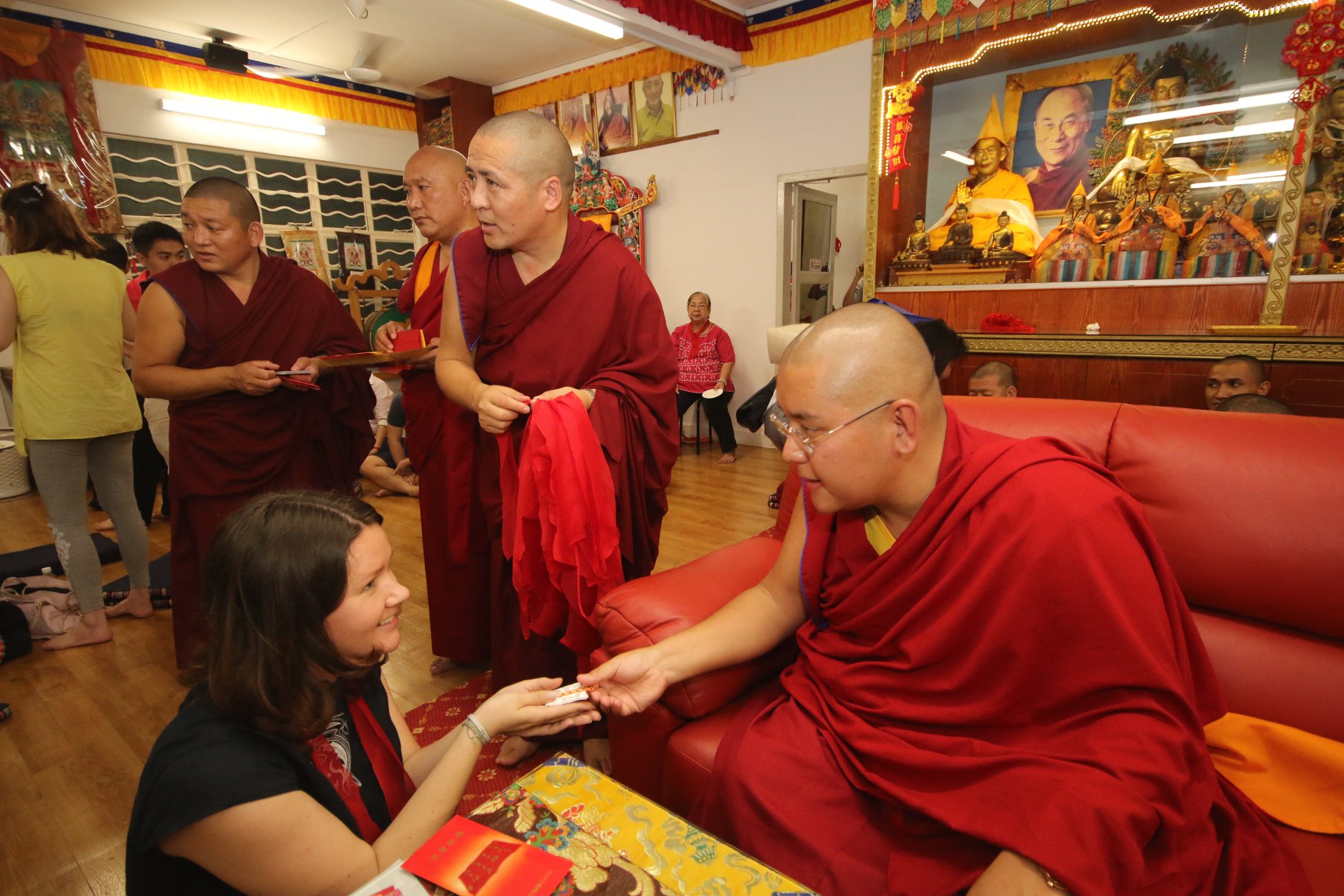 LYWA Russian translator Anastasia Stoliarova had the great honor to translate for H.E. Ling Rinpoche, earlier this month in Singapore. H.E. Ling Rinpoche presided over a Grand Puja event and bestowed several jenang, at the request of Gaden Shartse Dro-Phen Ling Buddhist Centre. In addition to translating LYWA publications into Russian, Ana is a Tibetan to English interpreter and a Tibetan language teacher at Istituto Lama Tzong Khapa in Italy.
LYWA Russian translator Anastasia Stoliarova had the great honor to translate for H.E. Ling Rinpoche, earlier this month in Singapore. H.E. Ling Rinpoche presided over a Grand Puja event and bestowed several jenang, at the request of Gaden Shartse Dro-Phen Ling Buddhist Centre. In addition to translating LYWA publications into Russian, Ana is a Tibetan to English interpreter and a Tibetan language teacher at Istituto Lama Tzong Khapa in Italy.
We are so grateful to work with so many amazing translators who make our publications and transcripts available in languages other than English. Please see our website for links to translations in sixteen languages.
Much Love,

Nick Ribush
Director
THIS MONTH'S TEACHING: Happiness Comes from Your Own Mind
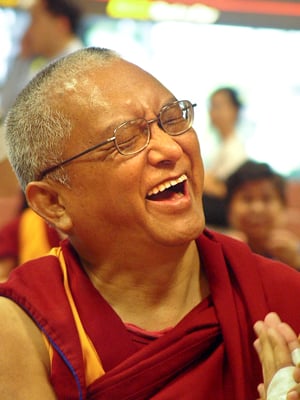 Peace and happiness in life come when we free ourselves from the dissatisfied mind of desire. Satisfaction comes when we give ourselves freedom, or independence, from the unhappy mind of desire.
Peace and happiness in life come when we free ourselves from the dissatisfied mind of desire. Satisfaction comes when we give ourselves freedom, or independence, from the unhappy mind of desire.
How do we free ourselves from the dissatisfied mind of desire and the other unhealthy minds that make our life unhappy? How do we fill up the emptiness in our heart? The answer is meditation. It is only through meditation practice that we can free ourselves from desire and other disturbing thoughts. And we then need to develop the good heart, not only not giving harm to other sentient beings but also benefiting them. Again that comes from meditation. That’s why we need to practice meditation.
No matter how many friends and other external things we have, that alone is not sufficient. We need friends, but no matter how many hundreds or even thousands of friends we have, that alone doesn’t bring us peace, happiness, and satisfaction. Even after we have found friends there is still something missing in our heart. We are not fully satisfied. That is because we have the dissatisfied mind of desire and lack loving kindness and compassion. Simply having friends is not sufficient to bring peace and happiness. We need to practice the good heart. What is missing is the good heart.
Also, no matter how much wealth we have, there’s still no peace, happiness, and satisfaction in our life. There is still something missing. Things are not perfect. Something else is needed. If we were able to obtain all the wealth in the world, or even if we were able to become just a millionaire, when we checked in our heart whether or not things were now perfect, we would still not be fully satisfied. There would still be something missing. There would be an empty place in our heart. This tells us that wealth alone is not sufficient to bring peace, happiness, and satisfaction.
What we need is something that frees us from the dissatisfied mind of desire and self-cherishing thought and brings satisfaction and the good heart. Again, the answer is meditation practice. This is what gives us freedom from the dissatisfied mind of desire, self-cherishing thought, and the other unhappy minds.
No matter how famous we are or how much power we have it is the same. Even if everyone in the whole world knew who we were, if we checked in our heart there would be something missing. Even though everything looked good on the outside, there would be something missing on the inside.
Again, what is missing is meditation practice, which transforms our mind from self-cherishing into cherishing other sentient beings, into loving kindness, compassion, and the good heart. Meditation also transforms the unhappy, dissatisfied mind of desire into the satisfied mind. Simply being famous or powerful cannot bring you this peace and happiness. Even if you are famous or powerful, it’s not enough. A free mind, a happy mind, a satisfied mind—all these come through meditation, not through external things. You have to obtain happiness from your own mind, through meditation. It is your own mind that stops your suffering and confusion; it is your own mind that brings you happiness.
Even if you had all the power in the world, if you didn’t have a good heart, that power could become dangerous. Without concern for others, the more power you got, the more dangerous you would become to other sentient beings in your country and in the world. It also means you would become more dangerous to yourself, since more harm to other sentient beings ultimately means more harm to yourself.
There is nothing wrong with having power—the problem is having power without having a good heart. Behind the power should be a good heart, which makes the power beneficial for the world and for all sentient beings. If there is no motivation of good heart for using the power, the power becomes like poison and is dangerous even to the person who has it. Having power is not sufficient. For the power to be safe, it has to come from the good heart.
You need meditation practice, even for your own peace, happiness, and satisfaction. It has to do with the mind, with your own mind. It’s not that somebody can transplant happiness into you, like transplanting a heart. The mind of a buddha or some other holy being can’t be transplanted into you. Happiness and satisfaction have to come from your own mind. You have to transform the minds that bring problems to you and to others into healthy, peaceful, positive minds—such as loving kindness, compassion, and altruism—which bring peace and happiness to you and to others.
Edited by Ven. Ailsa Cameron from teachings given by Lama Zopa Rinpoche in Auckland, New Zealand, 1990.
























